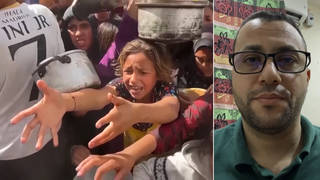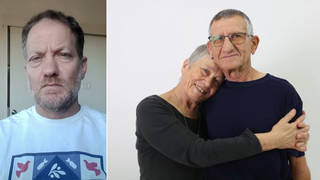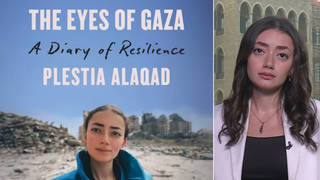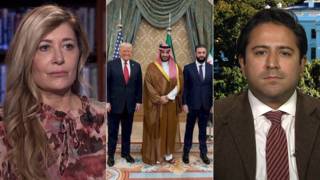
Guests
- Vijay Prashadprofessor of international studies at Trinity College. He is the author of several books, including Arab Spring, Libyan Winter and, most recently, The Poorer Nations: A Possible History of the Global South. His new article for The Hindu is called “The Architects of West Asia’s Chaos.”
As the United States weighs a major escalation with potential military aid to Ukraine, we look at how American policy is sowing conflict across North Africa and the Middle East. Libya is run by two different governments, and the United Nations has warned of “total chaos” if ongoing unity talks fail. The U.S.-backed regime in Egypt continues a crackdown on political opponents, recently carrying out its worst killing of protesters since General Abdel Fattah el-Sisi became president last June. Iraq is coming off its deadliest month in years, while outgoing Defense Secretary Chuck Hagel has said the U.S. might need to send noncombat ground troops for the ongoing campaign against the Islamic State. In Syria, the world’s worst current humanitarian crisis, the U.S. has backed off its calls for the ouster of President Bashar al-Assad. In Lebanon, Hezbollah and Israel exchanged fire last week in one of their most violent clashes since the 2006 war. The incident was followed days later by a Washington Post report that the CIA and its Israeli counterpart, the Mossad, assassinated a senior Hezbollah leader seven years ago this month. Now a dispute over Iran has brought relations between President Obama and Israeli Prime Minister Benjamin Netanyahu to their lowest point so far. Following the death of King Abdullah last month, Obama led a large delegation to Saudi Arabia in a major display of U.S. support for the new repressive regime. And in Yemen, uncertainty prevails after last month’s resignation of President Abdu Hadi, with Houthi rebels now threatening to seize power. We discuss the state of the Middle East and North Africa — and the U.S. role in ongoing conflicts — with Vijay Prashad, professor of international studies at Trinity College.
Transcript
AARON MATÉ: From the crisis in Ukraine, we turn now to turmoil across North Africa and the Middle East. And like in Ukraine, American policy past and present has played a major role in sowing conflict and unrest.
Libya faces its worst crisis since the U.S.-backed ouster of Muammar Gaddafi in 2011. The country is run by two different governments, each with their own parliaments and armies. In between are several other militant groups, including a branch of the Islamic State that took credit for a deadly attack on a Tripoli hotel last week. The U.N. mission in Libya is trying to hold unity talks between the two main warring factions. The U.N. mission chief recently warned Libya faces “total chaos” if the talks fail.
BERNARDINO LEÓN: The general impression is that the country is very close to total chaos, and that if they miss this opportunity, it’s very difficult to imagine that there will be a situation in the country that will allow easily to start a new process.
AMY GOODMAN: In neighboring Egypt, at least 18 civilian protesters were killed late last month while marking the fourth anniversary of the revolution that ousted Hosni Mubarak. It was the worst killing of protesters since General Abdel Fattah el-Sisi became president last June. Sisi’s regime has banned protests, continued a crackdown on political opponents. The U.S. renewed U.S. military aid last year after a brief pause following the 2013 coup. On Monday, an Egyptian court confirmed the mass death sentences of nearly 200 supporters of the Muslim Brotherhood, the party of ousted President Mohamed Morsi.
The crackdown has extended to journalists. On Monday, Al Jazeera reporter Peter Greste spoke out from Cyprus after being released from prison and deported. Greste had spent 400 days behind bars with two Al Jazeera colleagues.
PETER GRESTE: Look, I can’t tell you how relieved I am at being free. I mean, I really didn’t expect it. We were settling in for a period of months behind prison and for the retrial. And so, to be out now, today, with just a few minutes’ notice, really, is just, just extraordinary. But I also feel incredible angst about my colleagues, leaving them behind.
AMY GOODMAN: Peter Greste’s colleague, Egyptian-Canadian Mohamed Fahmy, appears close to release and deportation after renouncing his Egyptian citizenship. The fate of the third Al Jazeera prisoner, Baher Mohamed, is unclear, as he is an Egyptian citizen.
Meanwhile, Iraq is coming off its deadliest month in years. The United Nations says over 1,375 people were killed in January. In an interview last week, outgoing Defense Secretary Chuck Hagel said the U.S. might need to send noncombat troops to Iraq for the ongoing campaign against the Islamic State.
AARON MATÉ: In Syria, the world’s worst humanitarian crisis, the U.S. has backed off its calls for the ouster of President Bashar al-Assad. Despite training opposition fighters, U.S. actions in Syria now target the Islamic State, not the Assad government it once threatened to strike. As the U.S. wages its bombing campaign against ISIS, the militant group continues to kill foreign hostages, most recently two Japanese nationals.
In Syria’s neighbor, Lebanon, Hezbollah and Israel exchanged fire last week in one of their most violent clashes since the 2006 war. The incident was followed days later by a Washington Post report that the CIA and its Israeli counterpart, the Mossad, assassinated a senior Hezbollah leader seven years ago this month. The killing of Imad Mughniyah raises a number of legal issues, as well as the potential for reprisals from Hezbollah.
AMY GOODMAN: Seven years after that joint assassination, relations between President Obama and Israeli Prime Minister Benjamin Netanyahu are reportedly at their lowest point to date. White House officials have criticized Netanyahu for a planned trip to the U.S. next month to address a joint session of Congress on Iran.
To the south, President Obama led a large delegation to Saudi Arabia last month following the death of King Abdullah. Obama’s trip was seen as a major display of U.S. support for the Saudi kingdom despite its poor record on human rights at home and abroad. In an interview on CNN, President Obama defended the U.S. partnership with Saudi Arabia and his decision not to raise human rights concerns during his trip.
PRESIDENT BARACK OBAMA: Sometimes we have to balance our need to speak to them about human rights issues with immediate concerns that we have in terms of countering terrorism or dealing with regional stability.
AMY GOODMAN: To the south of Saudi Arabia is Yemen, where uncertainty prevails following the resignation of President Abdu Hadi last month. Houthi rebels have controlled the capital Sana’a since launching an offensive in September. They have set a deadline of today to seize power unless the political crisis is resolved. The Houthis appear to have major backing from Ali Abdullah Saleh, the longtime U.S.-backed president ousted by the popular uprising in 2011. Amidst the crisis, the U.S. continues a drone war inside Yemen targeting al-Qaeda in the Arabian Peninsula, AQAP, which has grown deadlier in recent years and took credit for the Charlie Hebdo massacre in Paris.
Well, to discuss the state of the Middle East and the U.S. role in ongoing conflicts, we’re joined by Vijay Prashad, a professor of international studies at Trinity College, author of several books, including Arab Spring, Libyan Winter and, most recently, The Poorer Nations: A Possible History of the Global South. His new piece for The Hindu is called “The Architects of West Asia’s Chaos.”
Professor Vijay Prashad, welcome to Democracy Now! Why don’t we talk about Israeli Prime Minister Benjamin Netanyahu coming to not the White House, not invited by the White House, but by—represented by the opposition to the White House in Congress, the House speaker, John Boehner? He’s going to be addressing a joint session of Congress.
VIJAY PRASHAD: Well, I mean, this has been a drama for several years, the so-called Netanyahu-Obama clash. This is not the first time that Prime Minister Netanyahu has decided to snub U.S. President Obama. This is not the first time that the Republicans have invited him to speak in Congress against the wishes of the White House.
But I think there is a little too much being made of this particular event—and a little too little at the same time. It’s a little too much because I think there’s been, over the course of the last several months, a return to a sort of stable set of alliances that the United States has had for decades—in other words, lining up again with its major allies, Israel, Saudi Arabia, and now Saudi Arabia and American-backed Egypt. These pillars of stability have asserted themselves in the region. It’s no secret that Mr. Obama has put a lot in terms of, you know, working with the Saudis in the region. So, I think, in that sense, too much is made of the clash with Netanyahu. There is a stability of U.S. and Israeli interests, and they’re going forward together on the ground.
There’s too little made of this because, unfortunately, this kind of clash that Mr. Netanyahu is setting up is going to bring up the problem of solving the dispute with Iran. To my mind, there is no way forward in the Middle East unless there is some rapprochement with Iran, not only from the United States, but also Saudi Arabia. And so, Mr. Netanyahu’s high-stakes game of coming to the U.S. Congress is going to muddy the attempt to create some rapprochement for one of the major contradictions in West Asia.
AARON MATÉ: And going to Israel’s north, to Lebanon, can you talk about this violence that erupted last week—two Israeli soldiers, one Spanish peacekeeper were killed—and then, days later, this revelation that the U.S. and Israel collaborated on a 2008 assassination of a senior Hezbollah figure in Damascus, in Syria?
VIJAY PRASHAD: Well, Aaron, you know, the problem in Syria has been grave: over 200,000 people dead, much of Syria destroyed, no sign of a political solution, increased audacity by the Islamic State and by Jabhat al-Nusra and other al-Qaeda-backed groups inside Syria. In this context, over the past almost two years, Israel has repeatedly struck against Hezbollah targets inside Syria. You know, there was a strike late last year in Damascus airport over apparent—a load of rockets that were coming in to resupply Hezbollah, perhaps from Iran. Just a few weeks ago, in the Quneitra area up in the mountains in Syria, Israel struck a car, killing an Iranian general and a 20-year-old Hezbollah fighter by the name of Jihad Mughniyeh. When this attack happened, Hezbollah chief Hassan Nasrallah gave a speech saying, you know, Hezbollah is going to respond now, finally, after so many provocations.
And so, what Hezbollah did was they didn’t attack across the blue line, which is the U.N.-mandated border between Israel and Lebanon, but they attacked in the Shebaa Farms, which is an area of Lebanon that Israel has occupied. In other words, it was a calculated attack inside the Shebaa region. Israel responded across the blue line, killing a Spanish peacekeeper. But within hours of the retaliation from Israel, Hezbollah contacted the U.N. peacekeepers and said that they are done with their attack on Israel, and now the status quo can come back. In other words, there have been provocations, but in a sense Hezbollah has been fairly disciplined in its retaliation. Nobody wants a war at this time between Hezbollah and Israel. It would complicate matters too greatly in the region. As it is, Jabhat al-Nusra is sitting at the borders of Lebanon, threatening to enter, threatening to create more chaos in that country. So nobody wants a war. Fortunately, this particular episode ended, you know, with—well, not peace, but the calm that was there before.
Of course, it wasn’t a very good thing that right after that what was revealed by The Washington Post and by Newsweek essentially validated what people in Hezbollah had known for a long time, which is that the father of the boy, the 20-year-old killed in Quneitra, Jihad Mughniyeh, his father, Imad Mughniyah, a major military chief of Hezbollah, had been killed in a massive car bomb in 2008 in Damascus, a bomb that was positioned by the Americans. It was triggered by the Israelis. This is not the first major car bomb that the Americans have used against Hezbollah. That was perhaps in 1985 in the attempted assassination of Hezbollah spiritual leader Mohammad Fadlallah. That was in Beirut in 1985. Fadlallah survived that attack, but 80 civilians died. So there has been a pattern of provocation. And fortunately, for now, this has not escalated into full-blown war.
AARON MATÉ: But the issues that this raises, the U.S. using a car bombing in a country where it’s not at war, in Syria, seven years ago, can you talk about the legal issues here? And also, do you see the potential for reprisals from Hezbollah?
VIJAY PRASHAD: Well, firstly, Aaron, as I said, this is not the first time that the United States has used a car bomb against Hezbollah when it has not been itself at war. In 1985, the bombing in Beirut was an enormous car bomb. It was placed by American intelligence and British intelligence. So there has been a pattern of utilizing this kind of assassination strategy against Hezbollah targets—not only Hezbollah targets, by the way, but also inside Iran against the nuclear—people associated with the nuclear program. There were a series of assassinations two years ago, you know, relatively unexplained.
This has, of course, got major legal ramifications. You know, the United States was not at war. The United States utilized Jordan, the kingdom of Jordan, to have the car bomb driven through. It associated with Israel in this strike. Of course, there is a different standard for the goose and a different standard for the gander. There has been no real international questioning of what has happened. There’s been no real outrage. I’m not surprised that at the Security Council this question wasn’t raised about using, you know, this kind of violence. Meanwhile, in 2005, you know, Mr. Hariri was killed inside Beirut, major politician in Lebanon, and there’s been a huge U.N. process of trying to uncover who killed Mr. Hariri. Here, CIA officials are directly saying that they conducted an assassination in Damascus, and there’s been absolutely no condemnation of it.
AMY GOODMAN: Professor Prashad, we only have two minutes, and we wanted to deal with President Obama’s trip to Saudi Arabia, the U.S. relationship with Saudi Arabia, and Yemen and Libya. Start with Saudi Arabia, very quickly, and move on from there.
VIJAY PRASHAD: Well, you know, the United States has begun to put a lot of eggs into the Saudi basket, hoping that Saudi Arabia is going to have stabilized the situation vis-à-vis the Islamic State, stabilized the situation in North Africa. I personally think this is a very myopic approach. I think the approach should be to create rapprochement between the different parties to the various conflicts, to bring Saudi Arabia and Iran together. But on the other hand, I think the Obama administration is, you know, trying to play both sides against the middle—on the one side, giving Saudi Arabia complete carte blanche, and on the other side, I suppose, keeping the talks with Iran going at a very mute level.
Libya is a victim of this Arab Cold War, where the regional entities are utilizing Libya as a battleground for their own particular, you know, forward policy, whether it’s Saudi Arabia and Egypt, on one side, or Turkey and Qatar, on the other. I mean, the West is largely absent from Libya, having used that as a laboratory to prove that it can conduct a military strike and create a good outcome. In fact, the opposite is demonstrated. The West is entirely absent. And as you know, the American Embassy is no longer in Libya. The American Embassy to Libya is based in Malta. And there’s no emphasis from the West to try to once again bring parties together. It is a very dangerous situation, which is why the U.N. envoy has repeatedly said over the course of several months that we are near total chaos inside Libya. It’s a real scandal, and I wish there was more reporting, more care, about what’s happening to a country that was destroyed by a war prosecuted by NATO.
AMY GOODMAN: And finally, the U.S. drone strikes in Yemen?
VIJAY PRASHAD: Well, you know, it’s clear to people who observe Yemen that until the U.S. drone strikes, until the U.S. invasion of Iraq, al-Qaeda had been largely vanquished in Yemen. And it was because of Abdullah Saleh, his own vendetta against the Zaidi people—
AMY GOODMAN: We have five seconds.
VIJAY PRASHAD: Well, to put it like this, the drone strikes don’t seem to be having the kind of impact that the government says they have. They seem to be having the opposite impact. It’s too bad that there’s been no reassessment of the strategy of assassinating people and meanwhile killing a very large number of civilians.
AMY GOODMAN: Vijay Prashad, we thank you for being with us, professor of international studies at Trinity College.












Media Options